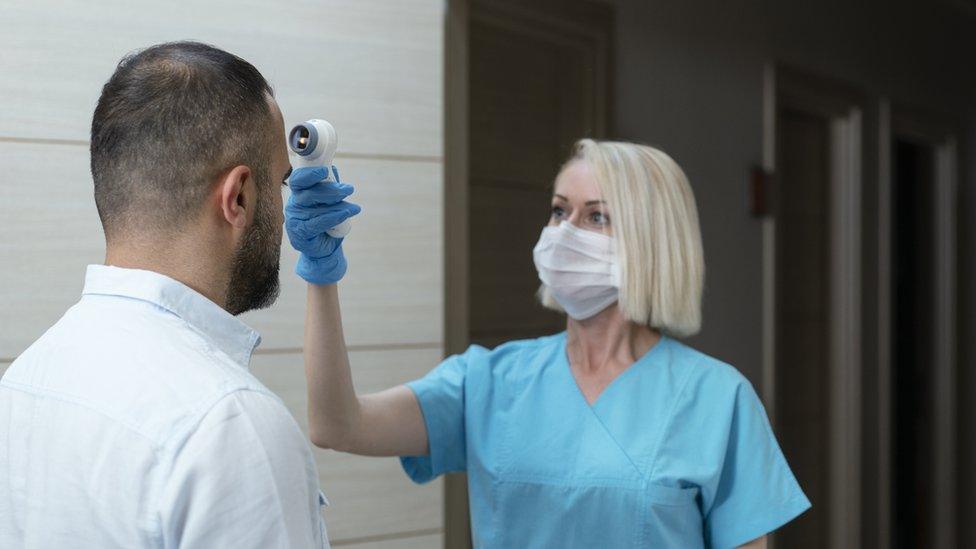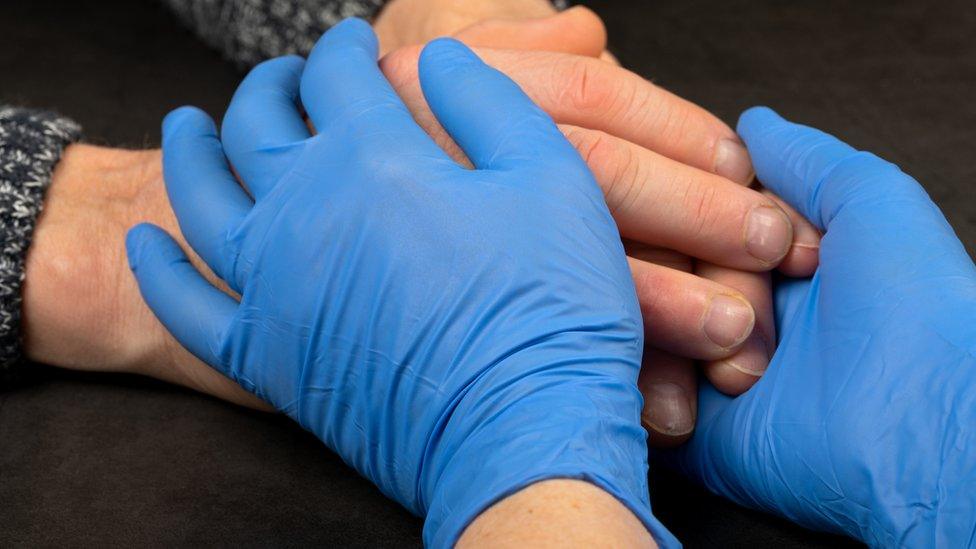Coronavirus: Contact tracing technology trialled at three health boards
- Published
- comments
Coronavirus: Test and trace 'fully ready' by the end of May
A contact tracing system to suppress coronavirus is to be trialled in three health boards from Monday, the Scottish government has said.
The software will be tested in NHS Fife, NHS Lanarkshire and NHS Highland.
Earlier this month, the government said testing and tracing would be "key" to the battle against the virus.
However, it has been revealed that despite 8,000 applications for 2,000 jobs as contact tracers, no-one has yet been hired.
The Scottish government has opted for a system of alerting people by a telephone call initially, rather than using a smartphone "proximity" app of the kind being trialled elsewhere in the UK.
But it has not ruled out making use of such proximity technology in future.
Health Secretary Jeane Freeman said the two-week pilot would allow health boards to test out the software which contact tracers will in future use to collect data.
She said 600 additional staff from the NHS were "ready to begin this work, as part of the process of recruiting up to 2,000 staff".
'Larger scale'
Scottish Labour has claimed the health secretary has "serious questions to answer" over why no tracers had so far been hired.
But Ms Freeman insisted the first "prong of the strategy" was to utilise existing NHS staff, and that others would be recruited once necessary pre-employment and disclosure checks were complete.
Speaking at the government's daily coronavirus briefing on Sunday, Ms Freeman said the software technology would allow contact tracing "on a much larger scale"

Jeane Freeman said existing NHS staff were being redeployed in readiness for the test and tracing rollout
The tracing software is different to the app piloted by the NHS in England which has been downloaded more than 55,000 times since being launched on the Isle of Wight.
Ms Freeman said the Scottish software would "focus on supporting public health teams to identify outbreaks".
She said it could reduce transmission in high risk groups and settings by making it easier for staff to collect and record information.
"The test, trace, isolate and support approach is about breaking the chain of transmission of the virus but it remains vital that alongside this people continue to follow physical distancing advice and practise good hand and cough hygiene," she said.
Ms Freeman said the technology would be rolled out to all health boards by the end of May and then "enhanced further" during June.
The health secretary said current NHS staff and "returning workers" would be the first and second group of contact tracers in place.
'Slow to hire'
As for new recruits, she said: "We need to go through proper pre-employment checks and disclosure checks as well as training.
"All of that work is under way and I am confident that we will get to that 2,000 number through that three-fold process but also with the help of other groups we are talking to, such as the St Andrew's First Aid Service."
Scottish Conservative leader Jackson Carlaw said the SNP had been "behind the curve" on contact tracing.
"The success of the test, trace, isolate scheme depends on having enough staff, and the SNP's lack of progress has put this and Scotland's ability to exit lockdown safely in jeopardy," he said.
Scottish Labour's health and social care spokeswoman Monica Lennon said the safety of the people of Scotland must not be "hampered by a failure to hire contact tracers".
She said: "Contact tracing should never have been abandoned.
"The cabinet secretary for health has been too slow to hire contact tracers despite clear demand for the role.
"The Scottish government did not act swiftly enough to protect the people of Scotland when a proactive approach to this incredibly serious public health emergency was needed."

There have been calls coronavirus testing to be expanded to care homes that are currently thought to be virus-free.
During the Scottish government briefing, Jeane Freeman also said the Scottish government had issued new guidance for arrangements in care homes.
She said the guidance, which will come into effect on Monday, would ensure "enhanced professional and clinical care oversight".
It comes after a leading care sector organisation called for coronavirus testing to be expanded to care homes that are currently thought to be virus-free.
Currently, all staff and residents are tested at a care home whenever there is a confirmed case of Covid-19.
Scottish care chief executive Donald Macaskill had earlier told the BBC that there should be regular testing of all staff and residents.
'Last resort'
Ms Freeman said the new rules would make sure clinical care, infection prevention and control, PPE and testing arrangements were "where we need them to be".
New measures added to the Coronavirus Bill, and to be considered by Parliament this week, would see the government take over the running of failing care homes.
Ms Freeman said these powers to ensure continuation of care would only be exercised as a "last resort".
"Further action will be taken to address any failings that arise, and will be taken quickly," she said.